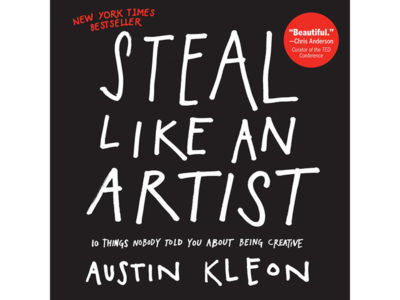
Hmm, yet another book on becoming more creative?
So, first of all, this book is awesome. It presents 10 principles that helps unlock creativity. It’s a quick read. You can finish it within a few hours. I thoroughly enjoyed it.
I love the way the author approached this topic. He keeps things to the point, short and practical. There’s great wisdom in every paragraph. They are in bite sizes, very easy to digest. I got many “ah-ha” moments here and there. Every few minutes, I’d pause and highlight them.
Overall, it’s like a friend is trying to help you discover a way to be a better yourself, rather than trying to teach you something.
I took my notes, and donated it to my team. Hope it will bring great energy to all of us. I highly recommend it to anyone and everyone who’s looking forward to being even a bit more creative than what we currently are.
The 10 principles:
- Steal like an artist.
- Don’t wait until you know who you are to get started.
- Write the book you want to read.
- Use your hands.
- Side projects and hobbies are important.
- The secret: do good work and share it with people.
- Geography is no longer our master.
- Be nice. (The world is a small town)
- Be boring (It’s the only way to get work done)
- Creativity is subtraction.
Some of my favorite quotes:
Nothing is original. … What a good artist understands is that nothing comes from nowhere. All creative work builds on what came before. Nothing is completely original. … Every new idea is just a mashup or a remix of one or more previous ideas. … You are, in fact, a mashup of what you choose to let into your life. You are the sum of your influences.
The artist is a collector. Not a hoarder… Hoarders collect indiscriminately, artists collect selectively. They only collect things that they really love. … You’re only going to be as good as the stuff you surround yourself with. Your job is to collect good ideas. The more good ideas you collect, the more you can choose from to be influence by. … Garbage in, garbage out.
You’re ready. Start making stuff. Fake it ’til you make it. … 1. Pretend to be something you’re not until you are — fake it until you’re successful, until everybody sees you the away you want them to; or 2. Pretend to be making something until you actually make something.
Start copying. Nobody is born with a style or a voice. … In the beginning, we learn by pretending to be our heroes. We learn by copying. We’re talking about practice here, not plagiarism — plagiarism is trying to pass someone else’s work off as your own. Copying is about reverse-engineering. It’s like a mechanic taking apart a car to see how it works. … First, you have to figure out who to copy. Second, you have to figure out what to copy. … you don’t just steal from one of your heroes, you steal from all of them. Don’t just steal the style, steal the thinking behind the style. You don’t want to look like your heroes, you want to see like your heroes.
At some point, you’ll have to move from imitating your heroes to emulating them. Imitation is about copying. Emulation is when imitation goes one step further, breaking through into your own thing.
In the end, merely imitating your heroes is not flattering them. Transforming their work into something of your own is how you flatter them. Adding something to the world that only you can add.
“When I get busy, I get stupid.” Ain’t that the truth. Creative people need time to just sit around and do nothing. … Take time to mess around. Get lost. Wander. You never know where it’s going to lead.
Your brain gets too comfortable in your everyday surroundings. You need to make it uncomfortable. You need to spend some time in another land, among people that do things differently than you. Travel makes the world look new, and when the world looks new, our brains work harder.
Creativity is subtraction. Choose what to leave out. Nothing is more paralyzing than the idea of limitless possibilities. The idea that you can do anything is absolutely terrifying. The way to get over creative block is to simply place some constraints on yourself.